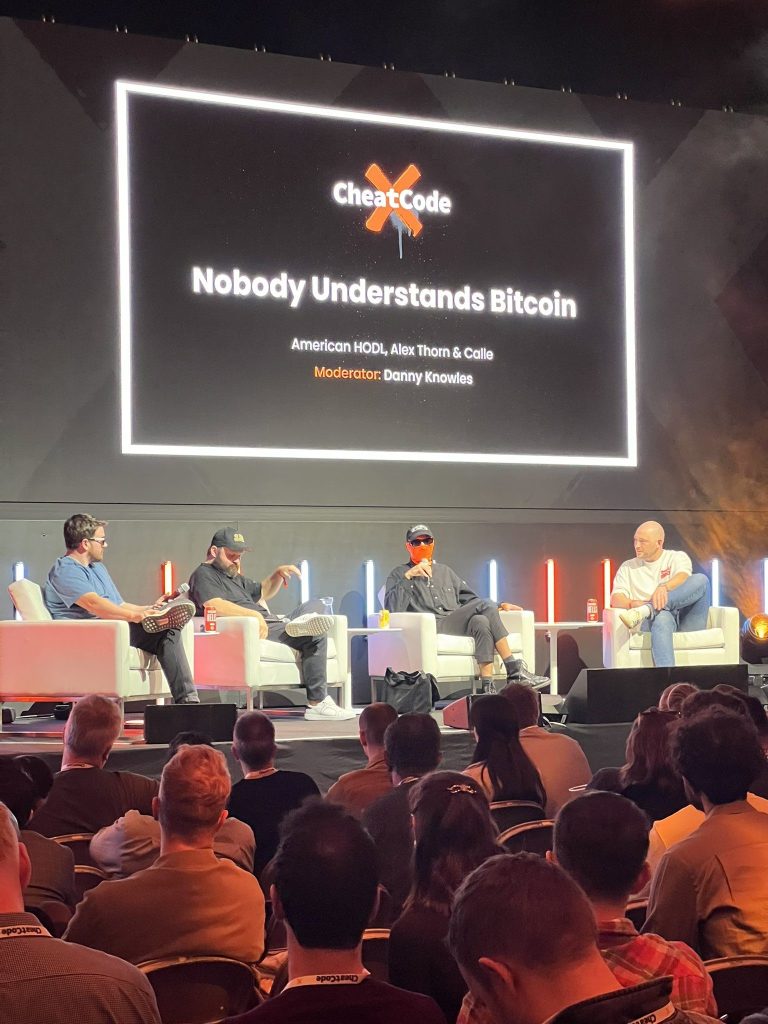Bedford is an unassuming town in middle England. It has beautiful views of the Great Ouse river running across the city, a busy centre and a plethora of things to do including some notable restaurants. At just 40 minutes from London St Pancras Station it is very close to the capital and with trains running every 15-20 minutes it is extremely accessible. Not a surprise then that someone approached organiser Peter McCormack during the event, telling him that he plans to move there. Could this not-so-well-known English town become the UK’s Bitcoin capital?
If CheatCode was anything to go by, there is a good chance of that.
Organization
If the organizers faced any problems, which they probably did, it was not evident at the event. Organization was immaculate for the duration. From the information communicated via social media and emails, the venue, catering, and the football event, nobody seemed to have left frustrated. The conference room was pretty full most of the time, but you felt comfortable even if you were standing. Security was respectful and the volunteers extremely helpful. Remember this was the first CheatCode event and since it probably sold out, expect to see a larger set-up next year.
Attendees
Not sure how other Bitcoin conferences go, but there was a surprising mix of people at this one. What stood out is the number of families and children that were at the event. Some of the discussion would have been pretty hard to absorb for those under 15, however it also shone a light on what we can expect of such next generation that is growing up to consider Bitcoin and blockchain technology as an established part of everyday life.
What About Bitcoin

The conference aired a multitude of perspectives on Bitcoin’s role in the financial ecosystem. Speakers like Harry Sudock emphasized the ever-present counterparty risk in traditional finance, while Jeff Booth drew comparisons between the growth of Layer 2 solutions and the early internet, highlighting the potential shift towards self-custody amid concerns of ETF rule changes and inflation’s impact on wages. Preston Pysh discussed the looming incentive for government intervention in treasuries, which may lead to unexpected fiat influx into crypto.
Discussions also touched on the repercussions of government actions such as the China mining ban, with minor implications for the global Bitcoin network, as noted by Sudock. Obi Nwosu provided a philosophical angle on the concept of trust, suggesting that in a digital world, we move towards ‘trust-minimized’ rather than ‘trustless’ systems.
Allen Farrington offered a critique of GDP as a metric of economic health, arguing that it reflects consumption rather than wealth creation, while Lyn Alden and Max Hillebrand provided insights into the broader economic indicators and behaviors like saving that signal macroeconomic trends.
Medium of Exchange

Additionally, the conference addressed Bitcoin’s evolution as a store of value and medium of exchange, with Lyn Alden pointing out the varied significance of Bitcoin as an MoE in different economic regions, from Africa to Latin America, in contrast to more stable economies like the US and UK. The sentiment that corporations and regimes fear Bitcoin’s power as a payment method was echoed by Bitcoin developer Calle, who also stressed the importance of Bitcoin’s utility as a medium of exchange globally.
Philosophers corner
I explain to students the degradation of their privacy. Then they pretty quickly grasp the money resistance concept.
Bradley Rettler (Professor at University of Wyoming)
In a highly interesting panel three academic philosophers delved into Bitcoin from an intellectual standpoint. Craig Warmke was struck by the Bitcoin whitepaper, finding the concept revolutionary. Andrew Bailey noted the paradox of Bitcoin’s perception of lack of intrinsic value despite the cost of its creation. Bradley Rettler discussed Bitcoin’s alignment with various political philosophies, pointing out its broader appeal beyond libertarian circles and emphasizing its significance in educating students about privacy and financial sovereignty.
Human Rights

CheatCode also had a very serious edge. Alex Gladstein of the Human Rights Foundation presented a compelling narrative on Bitcoin as a tool for human rights advocacy. He discussed the weaponization of traditional financial systems against activists, citing examples from Hungary to Nicaragua where governments attack the bank accounts of dissenters.
Gladstein emphasized Bitcoin’s ability to circumvent such financial censorship, highlighting its role in preserving wealth for those fleeing oppression, funding clandestine education, and securing donations away from governmental interference, like in Canada. Bitcoin is a powerful enabler of human rights.
In a conversation with Natalie Smolenski shortly after his presentation, Alex Gladstein touched upon Bitcoin’s transformative cultural impact. Gladstein suggested that Bitcoin is improving countries by enabling people to bypass restrictive government-led economic models. Smolenski observed that the growing trend toward consolidated state control over markets could be countered by the decentralized consensus model offered by Bitcoin, positioning it as a tool for socio-economic empowerment and a challenge to conventional governance structures.
Natalie Brunell Interviews Lyn Alden
Replying to Brunell, Lyn Alden discussed Bitcoin’s evolution, emphasizing its varying roles in different economies. In regions like Africa, where many currencies exist, Bitcoin is more critical as a medium of exchange than in places like the US and UK, where transaction friction is low. Alden also considered the future of real estate investment in the context of Bitcoin, suggesting the appeal of property may wane as markets are inflated due to investors seeking alternatives to fiat currency.
Addressing the current bull market’s energy, Alden pointed out the importance of improving Bitcoin’s user experience to ensure its utility and problem-solving ability are clear, essential for mainstream adoption over the next decade. On the topic of ETFs, Alden deemed them a necessary step in Bitcoin’s journey, not a significant concern but part of its maturation process.
Nobody Understands Bitcoin

Think of it in a different way: We could one day, all of us, decide, to freeze Blackrock’s assets.
Calle (In reference to a question about large corporations controlling Bitcoin)
The panel titled “Nobody Understands #Bitcoin” at the CheatCode conference brought together noted figures like American HODL, Alex Thorn, and developer Calle, hosted by Danny Knowles. They discussed Bitcoin’s operational rules, consensus, and threats from ignorance. Calle emphasized the autonomy in choosing to participate in the Bitcoin network and pondered the potential of collective decision-making against major corporate holders in the space.
The panel unanimously agreed on the infeasibility of ‘fixing the filters’ without breaking Bitcoin’s fundamental principles, highlighting individual self-interest alignment with Bitcoin’s functionality and expressing skepticism towards the alignment of ETFs with Bitcoin’s core values.
CheatCode Expanding to Australia & Philanthropy
The CheatCode Conference, could become a major event in the tech and cryptocurrency industry, as it announced its expansion to Australia, broadening its international footprint and creating opportunities for dialogue and collaboration down under. This move is part of an effort to turn CheatCode in one of the most notable global Bitcoin conferences.
In a significant philanthropic move, Peter McCormack has launched the “Bedford Development Fund,” an initiative aimed at nurturing talented young individuals from Bedford who lack the resources to succeed. This fund is set to provide the necessary support and opportunities to help these young talents realize their potential and contribute meaningfully to society.
Real Bedford Going Places with Major Investment News
This announcement caused quite a stir. Winklevoss Capital’s $4.5m investment into Real Bedford FC marks a significant foray into English football, with Gemini founders Cameron and Tyler Winklevoss joining forces with Peter McCormack. This partnership aims to realize McCormack’s vision of propelling RBFC, a ninth-tier club he bought in 2021, into the Premier League.
The investment will finance a new training center, football academy, girls and youth support, and establish a Bitcoin treasury, signifying a groundbreaking integration of cryptocurrency with sports development. The Winklevoss twins underscore their commitment not just to the club but to a shared dream for Bedford’s football future.
Jack Mallers on Bitcoin
Strike CEO Jack Mallers emphasized the importance of funding Bitcoin development, noting that laughter followed a candid discussion on the practicality of managing a multi-trillion-dollar project without developers. Announcing Strike’s expansion into Europe, Mallers also addressed Bitcoin’s need for ongoing maintenance, dismissing the concept of ossification and highlighting the naturalness of entropy and volatility.
On the topic of disagreements within the community, he acknowledged Michael Saylor’s desire for Bitcoin’s success and the healthiness of public discourse. For newcomers to Bitcoin, Mallers’ advice was direct: join the network, be proactive, and contribute to the change you wish to see, while humorously dismissing the notion that any one individual could unilaterally alter Bitcoin’s course.
The Game


Day 2 of the conference included a fun occasion. A game for 9th-tier Real Bedford which is challenging again for the title in an effort for back to back promotions. Many conference attendees went to the game alongside many locals with total numbers exceeding 1000 people which was a record for the club. The game ended in a 0-0 draw.
The CheatCode conference in Bedford has proven to be a fertile ground for groundbreaking discussions and strategic announcements that could shape the future of Bitcoin and the wider cryptocurrency landscape. From global expansion plans to significant investments in local talent and infrastructure, the conference has sparked a renewed enthusiasm in the potential of Bitcoin.
As speakers and industry leaders debate the technical, philosophical, and socio-economic facets of Bitcoin, one thing is clear: the ecosystem is evolving, and with it, the definitions of success, investment, and community engagement. The CheatCode conference has not just provided a snapshot of Bitcoin today but has set the stage for its trajectory in the years to come.
Author Profile

- Lucy Walker covers finance, health and beauty since 2014. She has been writing for various online publications.
Latest entries
- June 30, 2025NewsWireBank Savings at Risk: The Dark Side of EU’s Savings Standard
- April 25, 2025Global EconomicsWhistleblowers Unmask Schwab’s Toxic WEF Secrets
- April 9, 2025Global EconomicsTariff Tensions Drive Market Volatility
- March 18, 2025Global EconomicsRed in Name Only: Labour’s War on the UK Working Class




